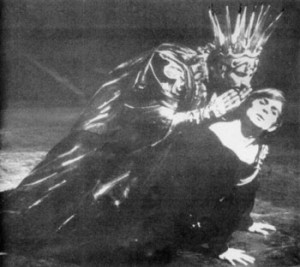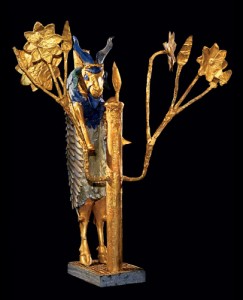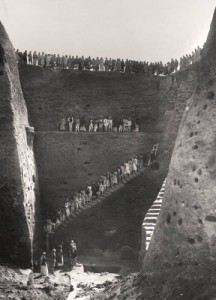Harry Lime’s charming brutality and selfishness does not set down a direction in life to anything except a boatload of enemies, a vacant heart and a probable early death. And who do you know who remains unmoved by the happiness or tragedy of strangers, of those “dots”? I would bet that number to be small. We seem to carry the seeds, at least, of a desire to bind ourselves to others we will never meet. But we cannot love an abstraction; it is not physically or emotionally possible to pledge our love universally to all of humanity. Megalomaniacs dream of doing so. We are told that only God in His multitudinous perfections can be personal and present for each of us. But what are we to do, poor insipid cases that we are, in seeking a universal belief in the value of an individual life when one deluge or another is forever poised above us, ready to erase us from time and memory?
I want some way of solving this that does not depend upon the Christian admonition that we should love one another because Christ loved us. Forget for a moment that many of those 2 billion Christians are afflicted by the same kinds of bigotry and therefore lack of universal love as non-Christians — what about the 5 Billion people who are not Christian? Why should they love another, love you, love me, and hold our lives, ephemeral as rust, as an essential good?
 Part of me has lived by the book since I was four or five and haltingly read the stories of martyrs from Lives of the Saints*. Because I love books, fiction# especially, I am drawn to memorable characters to try to reconcile this dilemma. They never took air into their lungs or felt gravity’s pull; they live only in our imaginations where we see in them some part of ourselves and of those we do know. That is why we place value on their invented lives. When we read, we step across the divide between the unreal and the living and declare that the unreal have value because we have value. Therefore, Hamlet’s almost deranged agony upon seeing and
Part of me has lived by the book since I was four or five and haltingly read the stories of martyrs from Lives of the Saints*. Because I love books, fiction# especially, I am drawn to memorable characters to try to reconcile this dilemma. They never took air into their lungs or felt gravity’s pull; they live only in our imaginations where we see in them some part of ourselves and of those we do know. That is why we place value on their invented lives. When we read, we step across the divide between the unreal and the living and declare that the unreal have value because we have value. Therefore, Hamlet’s almost deranged agony upon seeing and listening to his father’s ghost translates for
listening to his father’s ghost translates for
a scene from the Royal Ballet’s Hamlet. The ghost of King Hamlet, father of
Hamlet (Rudolf Nureyev) tells his son how he was murdered by his brother the
present king to ascend the throne.
us because we carry our own mournful experiences so close to our hearts. In the novel Beyond The Bedroom Wall, Alpha Neumillar’s joyous anticipation of her wedding translates for us because we carry our own sweet (or bittersweet) memories or anticipations of that day: “As we were sitting down to supper … Martin walked in, took my hand and led me to the front of the room, and put a ring, a half-carat diamond, on the finger that will hold the matching band, and I felt my heart would leave if I breathed out, the diamond’s so huge! ‘Yes,’ I said, holding the ring on show and being an actress. ’I’ll be married soon ….’ And then I realized how terrified I was …. (124).”
Fiction gives us archetypes of human beings and these archetypes become the connective tissues by which we value the anonymous individuals passing us in the street. We track the bones and ligaments, tendons and cartilage of those who never existed and attach them to the multitude who have and do exist. We build them bodies and smiles out of descriptions. Because of fiction we can begin to imagine their inner lives. That seems like the beginning of wisdom – others, even those I will never meet, are like me.
We match up the shadows of characters to living strangers. We can then throw those tempered imaginations into the whole cauldron of the world. That power may trigger cascades of associations that create versions of fellowships, however distant. We can begin to understand something about the life of a crippled woman in Lima, Peru trying to sell anticouchos and pancita in the El Malecon de Miraflores or an underpaid teacher in Belogorsk in the Ukraine, grumbling to himself as he listens to the furnace laboring to break the cold hovering in his classroom or a dreamy child resting on a hilltop on Pitcairn Island and looking across the endless Pacific to what she believes another kind of life would be like in New York or Paris.
The fictional imagination, this empathetic summoning, allows us to walk back into past time and like a grand magician seem to make its barriers disappear. Thus, in 2013 we might sit inside the shells of our homes on these cold nights and imagine ever more wonderful things:
Thus, in 2013 we might sit inside the shells of our homes on these cold nights and imagine ever more wonderful things:  from invisibility we can pluck the qualities of the artisan who constructed the Ram in the Thicket 4600 years ago in Ur. He (or she) made a statue almost 17 inches in height out of gold, silver, red limestone, a work requiring patience and an exacting and informed eye for the natural world; then fast forward to the roughly 150 workmen who arrayed themselves for a westerner’s desire for a photograph on the northeast face of the stepped ziggurat at UR in 1923. We cannot even see their faces, but we can inhabit them as they look back at the clumsy camera and feel their sore muscles earned by a long day of excavation.
from invisibility we can pluck the qualities of the artisan who constructed the Ram in the Thicket 4600 years ago in Ur. He (or she) made a statue almost 17 inches in height out of gold, silver, red limestone, a work requiring patience and an exacting and informed eye for the natural world; then fast forward to the roughly 150 workmen who arrayed themselves for a westerner’s desire for a photograph on the northeast face of the stepped ziggurat at UR in 1923. We cannot even see their faces, but we can inhabit them as they look back at the clumsy camera and feel their sore muscles earned by a long day of excavation.
We can venture to our beginnings. In his 2010 documentary The Cave of Forgotten Dreams, a reflection on the 30,000 year old cave paintings in Chauvet, France, Werner Herzog suggests that these paintings, the earliest ever discovered, were the moment when the human soul was born. At one point in the film a scientist described red hand prints left by one of the artists – he had a crooked pinky finger, and thus they were able to follow him deeper into the cave. That crooked joint makes him an individual, a person we can imagine millennia later in our own transitory here and now. My hands poised before me in this day’s sun are the same as the hands that shaped the Ram; I have the same body as the men who uncovered Ur with their hands; my hand can stretch itself like a wing just like the image of the red hand in the cave — our empathetic imagination entreats hands to appear and shazam — resurrects spirits.
The tragic nature of the world is that we cannot feel for billions. The gift of the world is that we can stand in for the billions. We want the burning life we feel inside us to be inextinguishable; our imaginations tell us that such fires exist in every other human being, our myriad companions. We can make the leap of faith to say, My life is important. His life is important. Their lives are important. In doing so we create a moral imperative, one tragically limited by time and space and history, but one we must embrace or betray ourselves for this is what we finally come to know — individuals everywhere signify individuals eternal.
#By fiction I mean to include every kind of narrative that takes us inside another’s life — poetry, drama, stories, novels, movies, tv shows, biographies, etc. I am using fiction clumsily here, I know, but what I’m after is a term that covers the universality of its methods and achievements.
*Lives of the Saints. Edited by Father Thomas Plassmann, O.F. M. Walter Black, Inc., 1953